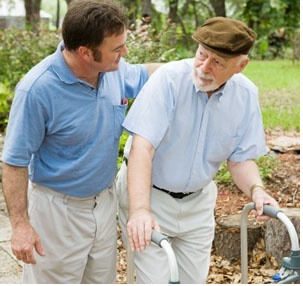As we age, we slow down and lose some of our physical or mental functions. However, not everyone who ages needs help or protection from the frailties and illness that come with aging. If you have an elderly family member for whom you might be concerned, there are warning signs he or she may not be safe and may need help.
There are ten (10) signs that may indicate your elderly family member needs help and that you should intervene:
1. Is he or she losing weight for no apparent reason? Inexplicable weight loss may indicate he or she are no longer eating properly for many reasons. This can result in many serious health problems.
2. Does he or she appear unclean? If he or she smells unclean, wears unclean clothing, or hair appears dirty, this may indicate mobility or memory loss issues that need to be addressed.
3. Is your elderly family member getting forgetful? If he or she is repeating the same conversation, asking the same question repeatedly, regularly missing appointments, having trouble remembering common words, or forgetting food on the stove with the stove on? These are signs your friend or family member may be experiencing memory loss.
4. Has your elderly family member’s mood noticeably changed? If he or she appears uncharacteristically depressed, forgetful, paranoid, confused, angry, or scared, this may be a sign of health problems such as an urinary tract infection (UTI), nutritional deficits, dementia, or other psychological deterioration.
5. Does he or she get lost while driving or had more than one (1) accident in the past two (2) years? If he or she has gotten lost while driving to a place they commonly travel to or have had more than one (1) accident in the past two (2) years, this may be a sign your parents are no longer safe drivers. This may be the result of memory loss or other mental deterioration.
6. Is your elderly family member able to walk without help or get in and out of a chair without assistance? If he or she is having difficulty getting in and out of chairs or can only get around the room by hanging onto furniture, this may be a sign he or she is having mobility problems. Mobility issues can increase their risk of falling.
7. Is he or she suddenly bouncing checks, having their utilities shut off, or having other financial problems? Sudden financial problems are often accompanied by unopened bills stacked on the table. These problems are signs your family member or friend is either losing their ability to manage finances or is being victimized by exploiters. Both have serious consequences to the elder and the ability for care for themselves.
8. Does your elderly family member have a new “friend” or “helper” that doesn’t seem appropriate? Is this new friend or helper taking control of their finances, isolating them from family and friends, or making disparaging comments about friends and family, your friend or family member is likely being exploited or abused by this new friend.
9. Is your elder family member’s home safe? Look around for piles of debris, throw rugs in pathways, low tables that blend into the shadows, or pet toys on the floor. If there are hazards in the home, your elderly friend has an increased risk of falling, especially if they have mobility issues.
10. Is your elderly family member becoming isolated? As we age and our physical abilities become limited, we tend to limit the social functions in which we participate and the outings we attend. Over time, this can lead to isolation. If your family member has stopped attending family functions, their church, or leaving their home for anything but the most pressing functions, he or she is probably isolated. Isolation can lead to health and psychological problems as well as vulnerability to exploitation and abuse.
If one or more of these signs are present, you should approach your elderly family member about these signs and offer to help. If you family member is in imminent danger, you should contact emergency medical services or law enforcement. Once any immediate crisis is resolved, you and your elderly family member should speak to an elder law attorney to see if there are planning steps that can be taken to prevent future problems while maintaining your family member’s independence as long as possible.



